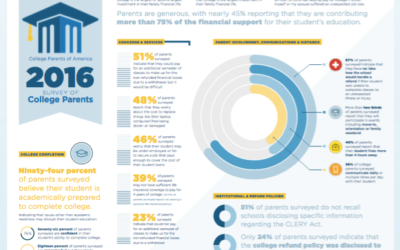
Today more than ever, communications between students and parents can often be a simple text message.
In fact, our 2016 survey of College Parents indicated that 36% of college parents surveyed communicate daily or multiple times per day with their student.
According to a study conducted by researchers at Ball State University, 99.8% of college students own cell phones, and the number of smartphones is increasing. That’s a lot of phones. But the majority of students use their phones, not for phone calls, but for text messaging. 94% of students say they text every day while only 73% say they make phone calls every day. So cell phones are everywhere – and they are used for texting more than for phone calls. Texting certainly has many advantages in many situations. Texting is quick – no need for niceties, texting can be thoughtful because there is time to think and edit before replying, texting is practical, texting can wait for a convenient time and doesn’t interrupt anyone unless that person chooses to read it.
How and when parents choose to communicate to their college student is important to consider. So why, then, should you bother to call your college student? A phone call can provide some important qualities that texting cannot. Here are a few things to consider when you are tempted to use texting or e-mail as your only means to stay in touch.
According to Vickie Nelson of Curry College & College Parent Central, “texting has many advantages in many situations. Texting is quick – no need for niceties, texting can be thoughtful because there is time to think and edit before replying, texting is practical, texting can wait for a convenient time and doesn’t interrupt anyone unless that person chooses to read it.”
Please share your thoughts and consider the extra benefits of a phone call, not just for the parent but for both the parent and student.
- Both people can convey a warmth that is only possible when you hear someone else’s voice.
- Both you and your student may have more to say during a phone call because it is still easier to talk to each other than to text. Difficult conversations or topics may still be difficult, but the effort involved is speaking is less. Both of you may be able to share more.
- Communication skills are a vital skill for college students to develop during college. Speaking up for their needs, expressing their disappointment and coping with the emotions of life.
- You can leave a message – and express your love and confidence in your college student.




